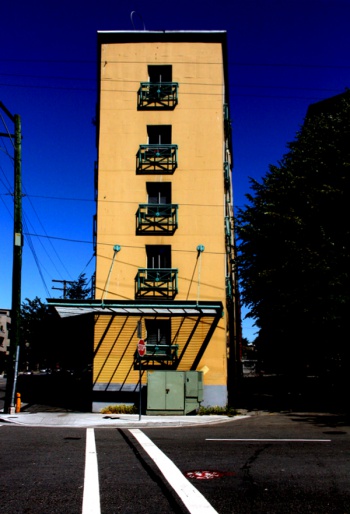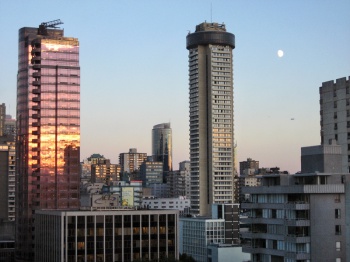
House in Gastown Vancouver by Nihat
Karakum
“Canada is carving out a top, while the United States is seemingly carving out a bottom”, wrote Gluskin Sheff economist David Rosenberg for the Financial Post in July. In his analysis, he compares the market in the United States with that in Canada and claims that current real estate prices in Canada are not sustainable. After the IMF report from January, this is another sign that the housing bubble in Canada is not just an imagined phenomenon. We should therefore examine the facts.
New Fules in Force
We have informed you about new mortgage rules that have been in force since July 9th. The government tries to curb down enthusiasm for these loans by reducing the maximum amortization period for government-insured mortgages from 30 to 25 years. Moreover, the amount of money owners can borrow when refinancing their property was decreased as well, from 80 to 65 percent. Another rule that has changed is that of the maximum gross debt service ratio to obtain Canada Mortgage and Housing Corporation insurance (from 44 to 39 percent). Households now cannot spend more than 39 percent of their income on mortgage payments, heating, and property taxes. As finance minister Flaherty told reporters for the Financial Post in Ottawa, “We watch carefully, we monitor the market carefully. I remain concerned about parts of the Canadian residential real estate market, particularly in Toronto, but not only in Toronto, so that is why we are intervening once again.” These new regulations are not that different from the previous rules, but they send a clear message to buyers. The question is if it is not to late and if they will be sufficient.
How Are the Most Active Markets Doing?
Since Vancouver and Toronto are the most active real estate markets in all of Canada, the bubble will be the most visible there. Let’s start with Vancouver. There were 2,098 properties sold here in July. The number might seem quite positive, but compared to the previous year it has declined by 18.4 percent (2,571 properties were sold in July 2011). In fact it is the lowest number since 2000! In spite of declining sales, prices rose by 0.6 percent from a year ago. In the end, these decreased sales may prove that new government regulations are in fact effective.
According to RBC report, there is no bubble in the Toronto condo market. They do find that “concerns about the actions of investors and speculators may be somewhat overblown or, at least, premature.” There are several reasons for this:
- Condos have become the biggest source of new rental units in the GTA because few apartment buildings have been built
- The total number of new housing units has not exceeded the GTA’s demographic requirements for population growth
 View from the Condo by Tom_K
View from the Condo by Tom_K
On the other hand, finance minister Flaherty and central bank governor Mark Carney are not so optimistic about Toronto. According to real estate statistics, prices fell by 6 per cent in June. Sales of new condos fell by half in the second quarter compared to the year before. Moreover, more than 18,000 condo units were left unsold at the end of the second quarter (a record high). It is true that prices are still rising, but they have grown at their slowest pace since early 2010. Moreover, some developers continue with construction in spite of the pessimistic outlook: “Despite talk of tightening credit to condominium developers, 7,343 units started construction in the second quarter of 2012, the highest level in over a year,” said Ben Myers, executive vice president at Urbanation, a condominium market research company.
Slowdown Predicted
Robert Hogue, senior economist of RBC, does not believe in the bubble in Canada’s real estate market, but that does not mean he thinks the market will rise as rapidly as it had before. He expects condo prices to fall by from 2 to 7 per cent from their highest levels. According to CMHC, the housing market in Canada is about to moderate, although it is hard to predict precise consequences. According to them, the softening should last more than one year.
Finance Minister Jim Flaherty said that this is good news. As he said to journalists, “I’d rather see some softening in the markets, particularly in Toronto and Vancouver, than have a rapid decline.” Since there was strong growth over the last decade, moderation should be perceived as natural.
Apparently, the new mortgage regulation has proven to be effective, but we can’t be sure whether it was too late. Moderation is unavoidable, and we’ve been expecting it for quite some time. Now it seems to be real. It’s certain that the markets in Vancouver and Toronto will calm down. The question now is how serious will the consequences be, and how many. It’s sometimes hard to accept a slowdown after years of growth, but it’s still much more desirable than the market crash we witnessed in the Unites States.

